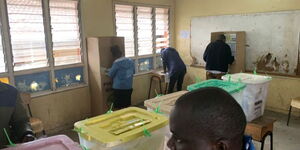A detective attached to the Directorate of Criminal Investigations (DCI) Forensic Crime Scene Investigations (FCSI) department has warned Kenyans of mistakes at crime scenes that could easily land them in prison.
Speaking during an interview, Forensic Expert Arphaxad Owange, broke down the intrigues of a crime scene. He begun by defining it as a place, object or person, dead or alive, found where crime has been committed.
Owange cautioned the public to desist from rushing to crime scenes. While recognising that in most instances the first responders to crime scenes are members of the public, he advised them not to engage unless it was a matter of life and death.
"When there are people who need to be salvaged or need to be rescued, the public are advised to go and secure that life," he stated.
However, in the absence of risk, being in a crime scene can land one into trouble. This is because when forensic experts are called upon to comb the scene, they could easily find evidence that leads to them, hence being named as suspects.
He explained that rushing to crime scenes could also pose a danger to them since most of them are classified as active.
Owange also warned Kenyans against evacuating victims of crime from the scene. He stated that this not only interferes with the scene but also puts an individual in the incident.
The forensic expert advised first responders should always document, preferably in video, if they have to move anything in the crime scene. Furthermore, they should immediately inform the police as soon as they arrive that they had moved the person, from what point to what point and give a reason as to why they did so.
On matters exhibit, the detective emphasized that Kenyans should not touch any exhibits in a scene. He explained that part of the forensics involves scanning the scene for fingerprints, which might be used as evidence.
"They should not touch any exhibit. They should leave the crime scene as it is," he warned.
Owange also warned first respondents against using facilities surrounding a crime scene. These includes washrooms and even dustbins.
Surprisingly, he also stated that citizens, should as much as possible, desist from eating a crime scene. Food particles containing saliva could easily be traced to them as saliva is among the specimen used to carry out DNA tests.
Moreover, citizens have been advised to carefully store their documentation at all times. For instance, should one's Identification (ID) Card be found in a crime scene, then it would be difficult to convince the authorities that he or she was not involved in the crime.
Owange, however, stated that the ID needed to corroborate with other evidence to make someone a person of interest in a crime.












